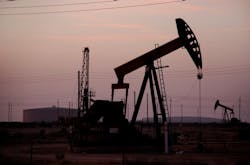DOE Selects Wastewater Bioenergy Project
A consortium led by the Water Environment & Reuse Foundation (WE&RF) has been selected by the U.S. Department of Energy (DOE) for award negotiations to begin Phase-One design and planning for a pilot plant that produces clean hydrocarbon fuels at a municipal wastewater treatment facility. The project will use breakthrough technology to produce fuels, such as gasoline, jet fuel, diesel and renewable natural gas, from wastewater solids.
The Central Contra Costa Sanitary District, near Oakland, Calif., will host the pilot system. The consortium includes WE&RF representing many of the 16,000 wastewater systems in the USA Genifuel Corp. with technology from DOE’s Pacific Northwest National Laboratory, Merrick & Co., Southern California Gas Co., Tesoro Corp., Metro Vancouver, MicroBio Eng., Brown and Caldwell, and more than a dozen utility partners.
The technology, called Hydrothermal Processing, converts waste solids from a wastewater treatment plant into biocrude oil and methane gas in less than one hour. The biocrude oil replaces fossil oil, providing green fuels with nearly zero net new carbon emissions. The methane gas can be used in the same ways as fossil natural gas. Biocrude oil produced in the system will be refined in an existing refinery, while the methane gas will be sold for transport in the gas pipeline system. If fully implemented in wastewater treatment operations across the U.S., the technology will produce more than 2 billion gal of gasoline equivalent per year. The system also produces fertilizer byproducts.
The selection was made by the Bioenergy Technologies Office, which is part of the Office of Energy Efficiency and Renewable Energy at DOE.
“We are very proud that our consortium was selected for award negotiation,” said Melissa Meeker, CEO of WE&RF.
The partners have demonstrated that they can convert wastewater solids into renewable hydrocarbon fuels using existing infrastructure, while replacing fossil fuels and reducing greenhouse gas emissions. A successful demonstration via the pilot plant in this project could transform wastewater treatment while contributing a substantial amount of clean biofuel.
Additional information on this project and the related research that supports it can be found at www.werf.org.
Source: Water Environment & Reuse Foundation
